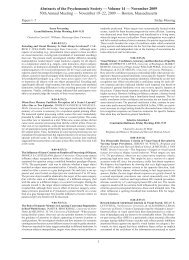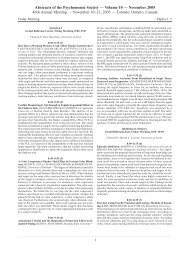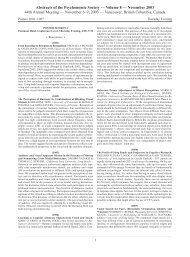S1 (FriAM 1-65) - The Psychonomic Society
S1 (FriAM 1-65) - The Psychonomic Society
S1 (FriAM 1-65) - The Psychonomic Society
Create successful ePaper yourself
Turn your PDF publications into a flip-book with our unique Google optimized e-Paper software.
Posters 5042–5047 Saturday Evening<br />
memory provides to goal directed responding is to inhibit task irrelevant<br />
information and to favor task relevant information in forming an<br />
attentional set. Problems related to failure to inhibit task irrelevant information<br />
are wide ranging. Is irrelevant information inhibited (not<br />
represented) or merely devalued (yet represented in working memory)?<br />
Evidence was gathered from a priming paradigm in which the<br />
prime and target were separated by varying SOAs. Targets were geons<br />
plus color; primes were words naming objects differing in color diagnosticity<br />
(high, low). Shape congruency to the primed concept was<br />
manipulated as was color congruency (for HCD primes). Subject’s<br />
task was to name the ink color in the target. Initial results suggest that<br />
an attentional set is formed across SOA emphasizing task relevant information,<br />
and that the predictability of the irrelevant information<br />
(shape) inversely relates to how little it interferes with task relevant<br />
processing (color naming).<br />
(5042)<br />
Endogenous Disruption of Exogenously Driven Prior Task Interference<br />
During Task Switching. MARK E. FAUST, AGNES JASINSKA,<br />
CURTIS POLLARD, RICH PREVILLE, JUNAID MERCHANT, &<br />
FADEL Z. ZEIDAN, University of North Carolina, Charlotte—We<br />
have previously reported on a prior task interference (PTI) effect, that<br />
reflects the deleterious influence of a previously relevant, but now irrelevant,<br />
stimulus attribute (e.g., color) following a switch to a new<br />
task. This PTI effect appears to be primarily due to stimulus-driven<br />
reactivation of the prior task set during performance of the switchedto<br />
task in that it did not diminish across the first two trials of the<br />
switched-to task and was not modulated by switch delay. We report 2<br />
new experiments demonstrating that a stop signal during the prior<br />
task, and the addition of a requirement for control on a stimulus dimension<br />
relevant for both tasks (e.g., semantic category), modulate<br />
the magnitude of the PTI effect. <strong>The</strong>se results suggest the inhibitory<br />
control of stimulus-driven activation of task-irrelevant information is<br />
at a lower level in a hierarchical system of cognitive control processes.<br />
(5043)<br />
Impaired Inhibitory Control in Recreational Cocaine Users. LOREN-<br />
ZA S. COLZATO, Leiden University, WERY VAN DEN WILDENBERG,<br />
University of Amsterdam, & BERNHARD HOMMEL, Leiden University—Cocaine<br />
is taking the place of ecstasy as second preferred recreational<br />
drug. Chronic use (daily consumption of cocaine) impairs response<br />
inhibition (Fillmore & Rush, 2002) but it is an open question<br />
whether and to which degree findings from chronic users extend to the<br />
“upcoming type” of recreational users (monthly base: 1–4 g). By<br />
using a stop-signal task we investigated the ability to inhibit and execute<br />
behavioral responses in adult recreational users and in a polydrug-matched<br />
sample (controlled for age, race, gender distribution,<br />
level of intelligence). <strong>The</strong> results showed that users required considerably<br />
more time to inhibit responses to stop-signals than did<br />
nonusers, whereas the two groups did not differ in their ability to execute<br />
responses. Hence, recreational use impairs response inhibition,<br />
although to a smaller magnitude than chronic use, indicating that the<br />
degree of cocaine use is proportional to the magnitude of performance<br />
difficulties.<br />
(5044)<br />
Influencing the Lingering Garden Path Effect Through Tasks of<br />
Executive Control. EVANGELIA G. CHRYSIKOU, KATHRYN<br />
SCHERTZ, & SHARON L. THOMPSON-SCHILL, University of Pennsylvania<br />
(sponsored by Sharon L. Thompson-Schill)—Garden path<br />
sentences produce comprehension difficulties because they lead the<br />
reader to an initial incorrect understanding of the meaning of the sentence.<br />
Research has shown that elements of the incorrect interpretation<br />
“linger” even after one has revised the original interpretation and<br />
presumably comprehended the sentence correctly. <strong>The</strong> present research<br />
examined whether exposure to a category-generation pretask,<br />
which has been shown to involve higher order cognitive executive<br />
processes, would influence lingering garden path effects. Participants<br />
129<br />
were randomly assigned to either a category-generation or a control<br />
condition and asked to read 92 sentences. Garden path sentences were<br />
randomly presented among five types of control sentences. Following<br />
each sentence, participants responded to a follow-up comprehension<br />
question. Correct responses, time to respond, and sentence reading<br />
speeds were measured. <strong>The</strong> results revealed significant lingering garden<br />
path effects, which were more pronounced in the categorygeneration<br />
condition and are consistent with proposals of fatigue in<br />
cognitive control.<br />
(5045)<br />
Mind Wandering Under Dual Task Conditions. PETER DIXON &<br />
HENRY LI, University of Alberta—Previous research by Schooler and<br />
colleagues has demonstrated that readers can reliably detect when<br />
they are mind wandering and not fully comprehending. In particular,<br />
when readers are periodically interrupted and asked whether they are<br />
on task, their responses correlate with subsequent measures of comprehension.<br />
In the present research, readers were asked to detect the<br />
letter e as well read for comprehension. Consistent with previous research<br />
using this task, the letter-detection task did not have substantial<br />
effects on comprehension. However, under these dual-task conditions,<br />
there was no relationship between the responses to mind-wandering<br />
probes and comprehension. We conclude that mind wandering (as<br />
measured by probe responses) interferes with elaborative processing<br />
but not low-level comprehension.<br />
(5046)<br />
Intertrial Control Overrides Top-Down Control in the Simon Task:<br />
An Event-Related Potential Study. GAMZE ALPAY & BIRGIT<br />
STÜRMER, Humboldt University, Berlin—In the Simon task, responses<br />
are faster when the response location corresponds to the taskirrelevant<br />
stimulus position (compatible assignment) than when it<br />
does not (incompatible assignment). This compatibility effect diminishes<br />
after a preceding incompatible trial. We investigated whether intertrial<br />
adaptation interacts with top-down control by cuing targets in<br />
a Simon task. Event-related brain potentials were recorded, and the<br />
contingent negative variation (CNV) in the cue–target interval was analyzed<br />
as a measure of action preparation. Cues with varying validity<br />
either predicted the task-irrelevant stimulus position or the compatibility<br />
of the target (enabling intentional preparation). Cuing the compatibility<br />
with full validity accelerated responses for compatible trials.<br />
This precue benefit was only observed with preceding compatible<br />
trials, whereas there is no Simon effect after incompatible trials at all.<br />
Moreover, the CNV was largest after preceding compatible trials and<br />
full cue validity. Intratrial control, hence, appears to override topdown<br />
control in the Simon task.<br />
• CLASSIFICATION •<br />
(5047)<br />
Classifying Partial Exemplars Leads to Learning Within-Category<br />
Information. ERIC G. TAYLOR & BRIAN H. ROSS, University of<br />
Illinois, Urbana-Champaign (sponsored by Brian H. Ross)—Recent<br />
work shows that category learning by classification may not result in<br />
learning some important knowledge people clearly possess, such as<br />
within-category information. However, most classification studies are<br />
conducted under narrow conditions not representative of natural classification.<br />
We compared “standard” classification to a slightly modified<br />
but more realistic task where exemplars appeared with missing<br />
features, with the idea that this change might lead to a wider distribution<br />
of attention. Typicality ratings collected after learning showed<br />
that learners who classified exemplars with absent features (Experiment<br />
1) or occluded features (Experiment 2) were more sensitive to<br />
prototypical but nondiagnostic features (e.g., has two eyes is typical<br />
of cats but does not distinguish them from dogs) than standard classification<br />
learners. <strong>The</strong>se results indicate that classification can,<br />
under some conditions, promote the learning of within-category information.<br />
Furthermore, they suggest the need to reconsider other





